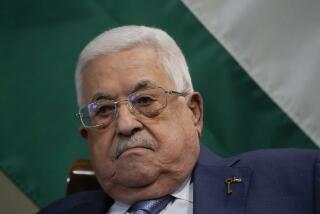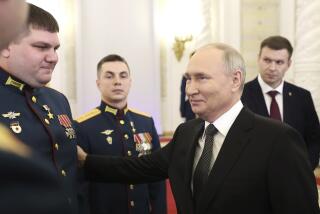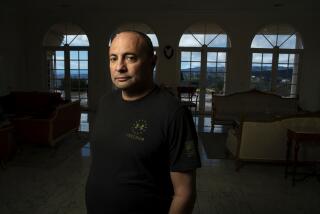Yeltsin Bringing Back His ‘Shock Therapy’ Aide : Russia: Yegor Gaidar will get key economics post. He was ousted as prime minister by Parliament last year.
- Share via
MOSCOW — In a stunning slap at conservatives, President Boris N. Yeltsin said Thursday that he intends to bring back Yegor T. Gaidar, the architect of Russia’s “shock therapy” economic reform who was sacked as prime minister by a hostile Parliament in December.
Yeltsin said Gaidar will return to the government to replace Oleg I. Lobov, the economics minister and deputy prime minister who had been feuding with the reformers in Yeltsin’s Cabinet.
Yeltsin told reporters he had not yet signed the order appointing Gaidar but that the 37-year-old economist had accepted the job effective Saturday.
The surprise move is aimed at ending the internal bickering that has weakened the Yeltsin administration. It comes amid growing Western concern about whether Yeltsin’s government can stabilize the political and economic situation and implement promised reforms.
Monthly inflation topped 30% in August, and Russia has failed to make prompt payment on some of its foreign debts. The International Monetary Fund has urged Moscow to implement stricter financial controls to keep the $2-billion aid package scheduled for delivery this year on track.
“The economy is so bad that there’s no other alternative to Yegor Gaidar, who was the most competent prime minister in Russian history after (Pyotr A.) Stolypin at the turn of the century,” said Alexander A. Pikayev of the Institute of World Economy and International Relations in Moscow. Stolypin, another free-market reformer, was assassinated in 1911 while attending the theater with Czar Nicholas II.
To Russian democrats, Gaidar is the very symbol of reform. To conservatives, he embodies what is wrong with the Yeltsin program, which they say is destroying Russia’s industrial base and impoverishing all but a few of its citizens.
“This is a very sensible step on Yeltsin’s part, if a bit late,” said Pavel G. Bunich, a leading Russian economist. The choice will give Russia’s government “a real leader” who will temper quick but painful “shock therapy” reform with flexible pragmatism, he said.
“But loudmouths from the opposition are going to scream bloody murder,” Bunich said. “The (free market) radicals will be delighted, the moderate centrists will be satisfied and the conservatives will be enraged.”
Indeed, reaction was swift and partisan.
“This is an extremely positive step,” said the Rev. Gleb P. Yakunin, leader of the Democratic Russia group. “It means that the market-oriented part of the government is winning.”
“Gaidar has ruined the Russian economy,” said Ilya V. Konstantinov, leader of the National Salvation Front. “His policies went bankrupt with a bang. Why give him a second chance?”
Gaidar lasted barely a year in office. His government freed most prices, began mass privatization of state-owned industry and tried to demilitarize the Russian economy.
He later said his biggest mistake was loosening the stringent credit controls that were blamed for causing unemployment. The freer monetary policy appeased few critics and sent the inflation rate into orbit at a velocity of about 2,500% a year.
“One always has mixed feelings about being the initiator of reforms,” Gaidar told The Times in an interview this week. “Of course, it would be much nicer to take over if the situation were not in collapse . . . and if no matter what steps you take the population was not bound to reject them.”
Though Gaidar was Yeltsin’s absolute czar of economics, his title was acting prime minister. In December, a Parliament horrified by the appearance of the previously unknown ills of inflation, recession and unemployment refused to confirm Gaidar as prime minister.
Viktor S. Chernomyrdin, a former Soviet oil industry manager, was chosen instead, but ironically Chernomyrdin has continued many of Gaidar’s policies.
Though Yeltsin was terse on the details of Gaidar’s appointment, he did say Gaidar would be a first deputy prime minister, which would place him under Chernomyrdin, his successor.
In other developments Thursday, Yeltsin named as his new ambassador to the United States Yuli Vorontsov, currently Russia’s permanent representative to the United Nations, the Interfax news agency reported, citing “well-placed sources in presidential circles.”
It was not clear what would become of the current ambassador, Vladimir P. Lukin, as Lukin has refused to become ambassador to Britain, Interfax said.
A successor to Vorontsov at the United Nations has not been named, but Andrei Kolossovsky, the Russian counselor, is considered a “proper” choice, Interfax said.
Times Moscow Bureau reporter Sergei Loiko contributed to this report.
More to Read
Sign up for Essential California
The most important California stories and recommendations in your inbox every morning.
You may occasionally receive promotional content from the Los Angeles Times.













